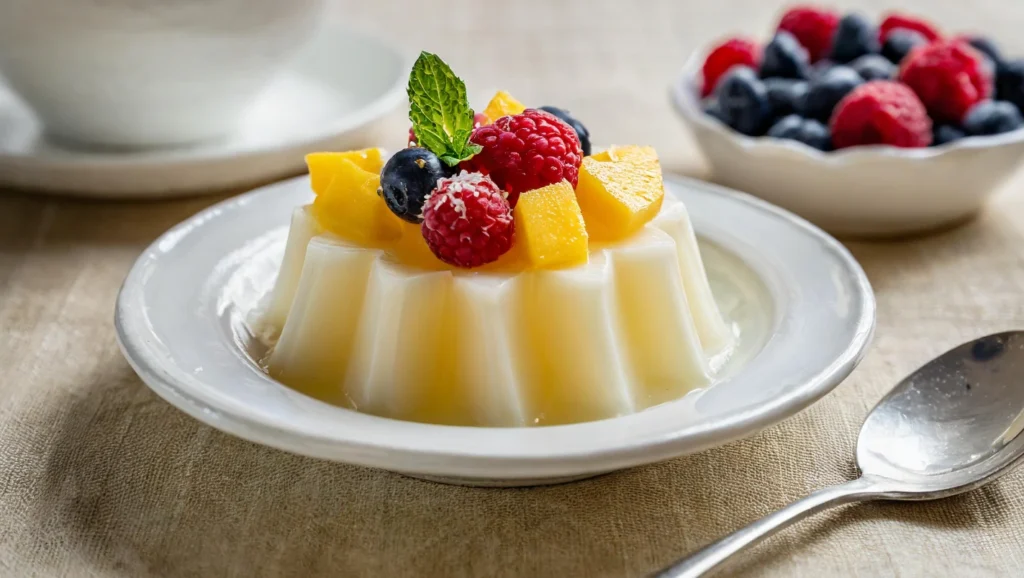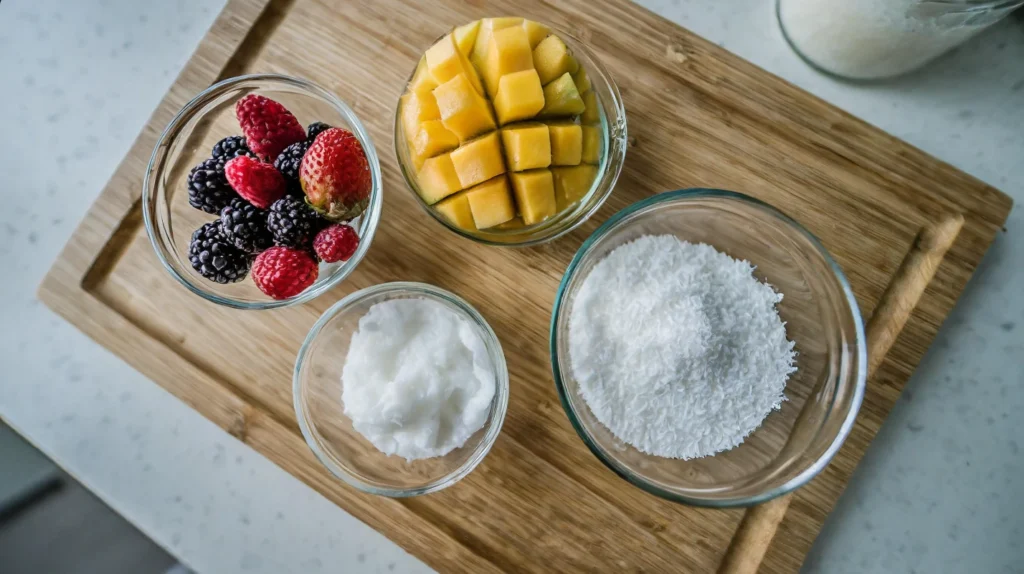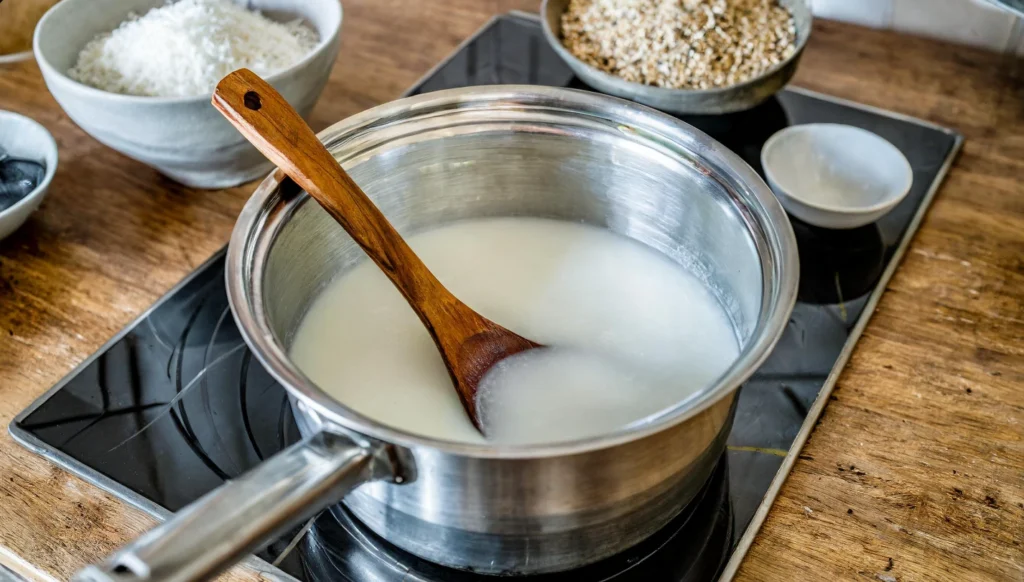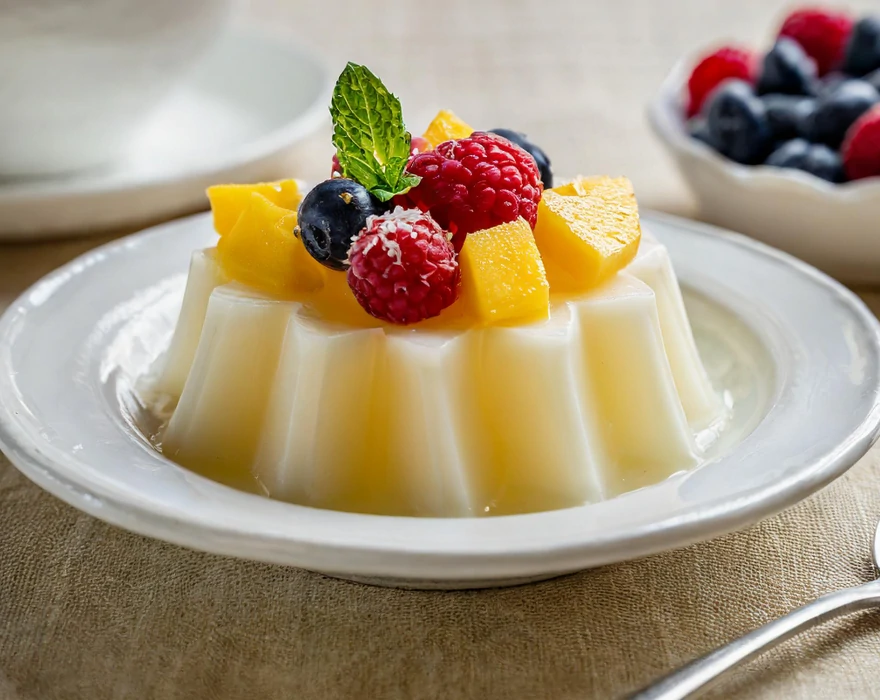
Introduction to Coconut Jelly
In the realm of desserts, coconut jelly stands out for its delightful texture and versatility. This gelatinous treat, made primarily from coconut water and sometimes enriched with coconut meat, serves as a testament to the culinary ingenuity of tropical cultures. It has navigated its way from the shores of the tropics to global dessert menus, celebrated for its unique ability to pair with a vast array of flavors and ingredients. The essence of it lies in its simplicity and the joy it brings to both the preparation process and the palate. As we delve into the nuances of making this exquisite dessert, we invite you on a culinary journey that promises to enrich your dessert repertoire with flavors of the tropics.
Nutritional Profile and Health Benefits
The allure of coconut jelly extends into its nutritional landscape, offering a bounty of health benefits encapsulated in its jiggly form. Crafted from the liquid of young, green coconuts, this jelly is a natural hydrator, packed with minerals like potassium and magnesium, essential for maintaining bodily functions. Here’s a glance at what makes it not just a treat for the taste buds but also a boon for health:
- Rich in Electrolytes: Vital for hydration, especially in hotter climates or after physical activity.
- Low in Calories: An ideal choice for those mindful of their calorie intake, wishing to indulge without guilt.
- Dietary Fiber: Aids in digestion and promotes satiety, helping in weight management efforts.
Its gentle sweetness and lightness make coconut jelly a preferred dessert among health-conscious individuals, blending seamlessly into diets that value natural, minimally processed foods. Beyond its health appeal, the process of making it, from the simmering of coconut water to the anticipation of the jelly setting, is a culinary experience that delights and satisfies. For more in depth health benefits make sure to check Znaturalfoods’ guide.
Coconut Jelly Varieties and Uses
Different types
The versatility of coconut jelly is evident in its various forms, each bringing a unique texture and flavor profile to the table. At its core, the jelly can be as simple as setting coconut water with agar-agar, but the adaptations are endless:
- Traditional vs. Modern: While traditional recipes stick to coconut essence, modern versions incorporate everything from coffee to exotic fruits, introducing a spectrum of flavors.
- Culinary Creations: In desserts, coconut jelly offers a refreshing element, while in beverages, it adds a delightful surprise of texture.
Culinary Applications
The culinary versatility of coconut jelly makes it a fascinating ingredient to explore:
- Desserts: From parfaits to tropical fruit bowls, it introduces an element of refreshment.
- Beverages: Bubble teas and cocktails are elevated with the addition of coconut jelly for an intriguing mouthfeel.
This exploration into the types and uses of this dish unveils its potential to transform ordinary recipes into extraordinary culinary experiences, inviting creativity and innovation in the kitchen.
How to Make Coconut Jelly at Home

Basic Recipe
Crafting coconut jelly in your kitchen is a straightforward process that promises delightful outcomes. Here’s how to make a basic coconut jelly, serving as a canvas for your culinary creativity:
Ingredients:
- 2 cups of coconut water
- 1 teaspoon agar-agar powder
- ¼ cup sugar (adjust based on preference)
- Optional: ½ cup coconut meat, thinly sliced for texture
Instructions:
- Combine and Heat: In a saucepan, mix the coconut water, agar-agar, and sugar. Heat the mixture over medium heat, stirring until the sugar and agar-agar dissolve completely.
- Simmer: Reduce the heat and simmer the mixture for 2 minutes, ensuring the agar-agar is fully dissolved.
- Add Coconut Meat: If using, add the coconut meat to the mixture, stirring gently to distribute evenly.
- Pour and Set: Pour the mixture into molds or a shallow dish. Let it cool at room temperature before transferring it to the refrigerator to set for at least 2 hours.
- Serve: Once set, cut the coconut jelly into desired shapes and serve chilled.
This basic recipe serves as a perfect starting point for those new to making coconut jelly. Its simplicity and the joy of watching liquid turn into a wobbly delight make it a must-try for every culinary enthusiast.

Advanced Variations
For those ready to take their dish to the next level, here are some variations to explore:
Flavored Coconut Jelly:
- Ingredients: Add ½ cup of pureed fruit (mango, pineapple, or lychee) to the coconut water mixture for a tropical twist.
- Method: Follow the basic recipe, adding the fruit puree during the heating process to infuse the jelly with flavor.
Layered Coconut Jelly:
- Ingredients: Prepare two batches of jelly, one using coconut water and another with fruit juice of choice, for a visually appealing layered effect.
- Method: Pour the first layer into molds and let it set partially in the refrigerator before carefully adding the second layer and allowing it to set completely.
These advanced variations invite you to experiment with flavors and presentations, turning the humble coconut jelly into a gourmet dessert.
Beyond the Kitchen
Coconut jelly is more than just a dessert; it’s a bridge to exploring cultures and flavors from around the world. Its simplicity belies the depth of creativity it inspires in kitchens, from casual home cooking to high-end culinary establishments. Whether you’re crafting a basic coconut jelly or experimenting with elaborate variations, the process is a celebration of the culinary arts, inviting chefs and home cooks alike to explore, innovate, and delight in the creation of something truly special.
As you embark on your coconut jelly journey, remember that the essence of cooking lies in exploration and the joy of sharing your creations with others. Whether serving a simple coconut water jelly or an elaborate layered dessert, the satisfaction comes not just from the flavors but from the love and creativity infused in every bite.
Conclusion
In wrapping up our exploration of coconut jelly, we’ve seen how this simple ingredient can be the star of the culinary show, from basic treats to elaborate desserts. It’s a journey that has taken us through the art of jelly making, demonstrating the versatility and creative potential of this tropical delight.
For those inspired to further their culinary adventures, Daily Recipe Haven is your go-to resource. Whether it’s exploring the sweet tang of lemon blondies, diving into the tropical flavors with guava paste recipes, or baking up a vibrant berry cake, there’s a wealth of inspiration waiting.
Remember, coconut jelly isn’t just about the recipes we follow but the joy and creativity they spark in our kitchens. Here’s to the delightful discoveries and tasty creations coconut jelly will bring to your table!

Discover the Delights of Coconut Jelly – A Tropical Treat
Coconut jelly stands as a delightful and refreshing treat that has captivated the hearts of many around the globe. This gelatinous dessert, made primarily from the water and meat of young coconuts, offers a unique taste that is both subtle and refreshing. Unlike traditional jellies, coconut jelly boasts a more natural and less sweet flavor profile, making it a favorite among those who prefer less sugary desserts.
Ingredients
- 2 cups of coconut water
- 1 cup of coconut milk
- 2 tablespoons of agar-agar powder
- ¼ cup of sugar optional, adjust based on sweetness preference
- Fresh fruits for garnish optional
Instructions
- Step 1: Prepare the Agar-Agar
- In a small bowl, mix the agar-agar powder with a little bit of water (just enough to dissolve the powder). This helps prevent lumps from forming when you add it to the hot liquid.
- Step 2: Heat the Coconut Water and Milk
- Pour the coconut water and coconut milk into a saucepan. Add the sugar if you’re using it. Warm the mixture over medium heat, but don’t let it boil. Stir continuously until the sugar has fully dissolved.
- Step 3: Add the Agar-Agar
- Once the sugar has dissolved, add the dissolved agar-agar to the saucepan. Keep the mixture on medium heat and stir constantly for about 2-3 minutes. Agar-agar needs to be heated to activate its gelling properties, but the mixture should not boil.
- Step 4: Pour into Molds
- After the agar-agar is completely dissolved in the mixture, remove the saucepan from the heat. Carefully pour the liquid into molds or a shallow dish. Silicone molds work great for individual servings, but you can also use a square dish and then cut the jelly into pieces once it’s set.
- Step 5: Let It Set
- Allow the mixture to cool down to room temperature. Then, refrigerate it for at least 2 hours, or until the jelly is firm and fully set. The setting time can vary based on the thickness of the jelly and the temperature of your refrigerator.
- Step 6: Garnish and Serve
- Once the coconut jelly has set, you can unmold it by gently pulling the edges away from the mold and inverting it onto a serving plate. If you used a dish, cut the jelly into your desired shapes.
- Garnish with fresh fruits such as mango, berries, or kiwi for added flavor and a beautiful presentation.
